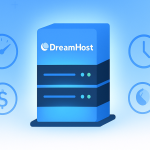For web developers, digital agencies, and entrepreneurial freelancers, Reseller Hosting represents a powerful opportunity. It allows you to transform a service you already rely on—web hosting—into a profitable, recurring revenue stream. You gain the ability to operate your own hosting company, complete with custom branding, competitive packages, and private client control panels, all without the massive investment and technical headache of maintaining physical servers.
Reseller hosting is, fundamentally, a low-risk gateway into the web hosting industry. It is a strategic move for those looking to deepen client relationships, secure predictable monthly income, and professionalize their service offerings.
This guide will comprehensively break down the reseller hosting model, detailing the step-by-step process of starting your business, analyzing the keys to profitability in 2025, and providing the critical metrics necessary to choose a reliable parent hosting provider.
Part 1: The Foundation of Reseller Hosting
Reseller hosting is often described as the “white-label” business model of web infrastructure. You become the retailer, buying in bulk from a wholesale supplier (the parent host) and selling individual units to your end-users.
What is Reseller Hosting?
Reseller hosting is an arrangement where a client purchases a fixed amount of server resources (disk space, bandwidth, CPU capacity) from a major hosting provider and is granted permission to redistribute those resources to their own customer base for a profit.
Key Characteristics:
- White-Label Branding: The service is delivered entirely under your brand name (your logo, your customer portal, your domain). Your clients never see the name of the parent hosting company.
- Parent Company Responsibility: The backbone infrastructure—server maintenance, network security, operating system updates, hardware replacement, and ensuring uptime—remains the responsibility of the parent host.
- Reseller Responsibility: You, the reseller, are responsible for marketing, sales, billing, creating hosting packages, and providing Tier 1 (Front-Line) customer support.
How the Ecosystem Works (The Management Stack)
The simplicity of reseller hosting is enabled by two specialized tools provided by the parent host:
- 1. WebHost Manager (WHM): This is your main administrative control panel. The WHM interface allows you to:
- Create, modify, and terminate individual client hosting accounts.
- Monitor the overall resource usage of your bulk plan.
- Set up custom DNS nameservers (e.g.,
ns1.yourbrand.com). - Manage and assign security features like firewalls and SSL certificates.
- 2. cPanel (The Client Interface): When you create an account for your client through WHM, they are given access to the industry-standard cPanel. This is where your clients manage their own specific site:
- Uploading files.
- Creating email accounts and databases.
- Installing CMS platforms like WordPress, Joomla, or Drupal.
Note: Most leading reseller plans are Linux-based and utilize this powerful WHM/cPanel combination.
Part 2: Strategic Advantages and Ideal Candidates
The reseller model offers compelling strategic and financial benefits that make it an excellent choice for specific professionals and entrepreneurs.
Financial and Strategic Benefits
- Low Barrier to Entry: You launch a hosting company with minimal capital. There is zero need to purchase, rack, or manage expensive servers, mitigating the single greatest cost hurdle in the hosting industry.
- Recurring Passive Revenue: Hosting generates dependable monthly or annual fees (subscriptions). This reliable Monthly Recurring Revenue (MRR) is the foundation of a stable business and is highly valued.
- Total Brand Control: The white-label feature allows you to build genuine brand equity. Your clients view you as the authoritative hosting provider, reinforcing their trust in your overall business.
- Built-in Scalability: As your client base grows, you simply upgrade your bulk reseller plan to a higher tier of disk space and bandwidth. This process is seamless and avoids costly hardware migrations.
Who Should Seriously Consider Reseller Hosting?
Reseller hosting is not a good fit for general hobbyists, but it is an invaluable tool for professionals already operating in the web space.
| Ideal Candidate | Strategic Benefit | Core Offering |
| Web Designers & Developers | Value-Add & Retention. Secure clients after the build phase. | Bundling hosting, domain, and an ongoing maintenance contract. |
| Digital Marketing Agencies | Control. Prevent clients from signing up for poor hosting solutions. | Selling high-performance hosting optimized for SEO tools and speed. |
| Niche Entrepreneurs | Differentiation. Focus on a specific, underserved market. | Hosting specifically optimized for local businesses, realtors, or WordPress speed fanatics. |
| IT Consultants | Streamlined Management. Consolidate client hosting under one billing portal. | Offering managed security, backups, and staging environments to small business clients. |
Part 3: The Profitability Question (Making Reseller Hosting Profitable)
While starting a reseller business is easy, making it truly profitable requires strategic pricing and service bundling.
The Profitability Formula
The base profit margin for raw hosting resources can be modest. For example:
- Your Cost: $40/month for a Reseller Plan (enough for 20 accounts).
- Your Sale Price: You sell each account for $8/month.
- Base Revenue (10 clients): 10 accounts × $8/month = $80/month.
- Base Profit (10 clients): $80 – $40 = $40/month.
The Path to Exponential Profit: Profitability scales rapidly once you break even on your monthly plan cost (e.g., around 5-7 clients). The key, however, is to increase the value of your average client contract beyond basic hosting.
Crucial Tools for Business Operations
To maximize efficiency and profit, select a parent host that provides or integrates with key business tools:
- Billing Automation (WHMCS/ClientExec): Essential software that automates invoices, payment processing, client sign-ups, and subscription cancellations. Avoid providers that do not include a free or discounted license for this software.
- CRM Integration: The ability to link your client hosting accounts directly to your customer relationship management system.
- Automated Backups: Robust, off-server backup solutions that you can easily restore for clients, allowing you to charge a premium for reliability.
Part 4: Critical Factors for Choosing a Parent Host
Your success is inextricably linked to the performance and reliability of your parent host. Prioritizing the wrong metrics can lead to client turnover and endless support demands.
1. Reliability and Performance (The Uptime Guarantee)
Your clients will blame you for any downtime.
- Uptime SLA: Demand a host with a 99.9% Uptime Service Level Agreement (SLA). Research their track record of network reliability.
- SSD/NVMe Storage: Ensure the parent host utilizes solid-state drives (SSD) or, ideally, faster NVMe SSD storage. Disk speed is the single most important factor for website load times.
- Turbo/Performance Tiers: Look for hosts that offer “Turbo” or high-performance options (like LiteSpeed web servers) that allow you to charge a premium for significantly faster speed.
2. Tier 2 Support Quality
While you handle front-line support, you will inevitably need to escalate complex issues (server failures, network issues) to your parent host.
- Availability: Demand 24/7/365 support via multiple channels (live chat, phone, ticket system).
- Expertise: The support staff must be knowledgeable in WHM, cPanel, and enterprise-level troubleshooting, not just general hosting inquiries.
3. Scalability and Resource Management
Your reseller plan must be flexible enough to accommodate your growth:
- Resource Pooling: Understand how resources (especially CPU and RAM) are allocated. Can clients burst beyond their limits? This impacts overall server stability.
- Easy Upgrade Path: The host must offer a clear, seamless migration path to a higher-tier reseller plan, or even eventually to a Dedicated Server if your business outgrows the reseller model entirely.
Conclusion: The Gateway to Entrepreneurship
Reseller hosting is the ultimate business model for the digital entrepreneur who wants to leverage their existing skills in web development or digital services to build a predictable, scalable recurring revenue stream.
By strategically bundling hosting with value-added services (maintenance, security, SEO optimization), selecting a rock-solid parent host, and focusing on stellar customer support (as you are the front line), you can successfully transition from being a service provider to becoming the trusted, branded host for your clients.
In 2025, with digital transformation accelerating, the demand for reliable, managed hosting services has never been higher. Reseller hosting offers the ideal structure to capture this demand without the prohibitive costs of starting a hosting empire from scratch.



